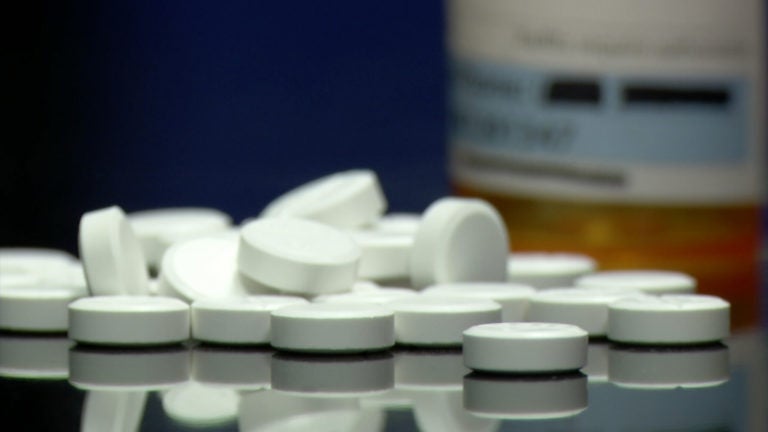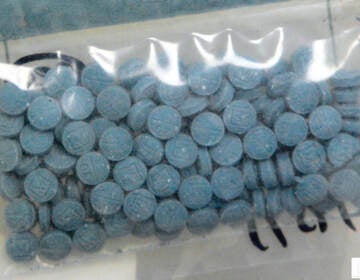Amid opioid crisis, treatment providers question N.J. state oversight
Health Department promises to address concerns raised over licensing of facilities offering addicts medically assisted treatment

As awareness of opioid addiction has grown, new treatments have emerged, including new forms of medication-assisted treatment. (NJTV News)
This article originally appeared on NJ Spotlight.
–
When opioid addicts decide to seek treatment, the window of opportunity is small and can close quickly. Someone looking to turn their life around can change their mind in a moment if they get a text from a dealer or fellow drug user.
Given these facts, some outpatient treatment providers in New Jersey are chafing at recent state regulatory actions that they said would force them to turn away certain individuals seeking medicated assisted treatment, now considered the gold-standard of care for those with opioid addiction.
These providers — some who have offered so-called MAT for years — said they respect the need for safety protocols, but they feared that what appears to be new enforcement of licensing requirements intended to protect patients could instead cost lives, given the deadly nature of addiction, which caused the deaths of eight New Jerseyans a day last year. Plus, they noted, oversight efforts that work to limit MAT services seem counter-intuitive for an administration that has worked so hard to expand access to this type of treatment.
Specifically, advocates said inspectors with the state Department of Health had visited more than two dozen providers in recent months, raising questions about adherence to licensing requirements and, in some cases, allegedly saying the providers could not see new patients until issues were resolved.
The state Department of Health, which licenses these and other health care facilities, is now working to address providers concerns and keep them working to safely treat patients. Department leaders hosted a “listening” session Wednesday with invited representatives from roughly 140 providers to discuss issues like staffing qualifications, industry trends and safety standards.
“The Department will consider all feedback received as it moves forward with proposed rulemaking as well as regulatory waivers,” said the DOH’s Dawn Thomas. She described the session as a “productive and open dialogue… regarding how best to reduce barriers to access to treatment for opioid use disorder but still maintain appropriate protections.”
Thomas said that details on the waivers — which would presumably give facilities some time to adopt changes — will be shared with providers next week, and regulations will be posted on the department’s website when they are finalized.
Some providers encouraged
Some provider groups were extremely encouraged by the meeting and the potential outcome, and credited the department for acting aggressively and expeditiously to make changes to protect patient access.
“We were very pleased. It was very positive and they’ve taken all our concerns very seriously,” said Deborah Wentz, president and CEO of the New Jersey Association of Mental Health and Addiction Agencies, which represents at least 150 providers statewide. “That’s the way government should work.”
Others were more circumspect, however. They said it is not clear what triggered the recent licensing enforcement actions or how the department will revise its policy or create waivers. In addition, some are confused as to why it took the state so long to respond to an issue they said they have been raising with multiple officials since January, especially given the need for more MAT providers.
DOH declined to respond to questions about the policy, licensing changes or the enforcement process.
Treatment providers have been hesitant to speak publicly about the licensing issue for fear it would damage their standing with state regulators. But one provider group made its concerns clear in a letter to DOH Commissioner Judith Persichilli, which was obtained by NJ Spotlight.
“The patients who are denied timely access to MAT are at a very high risk for overdose and death. The addiction treatment community has worked too hard to stem the tide of opioid fatalities to see lives lost to a bureaucratic licensing snafu,” a leader of the group wrote, urging state officials to work across departments to ensure treatment access. “The lives of New Jersey residents afflicted with the disease of addiction literally stand in the balance of this decision.”
A grim toll rolls on
While drug-related deaths declined by 3% last year, state figures show 3,021 New Jerseyans still lost their lives in 2019 using illegal — or illegally acquired — substances; another 280 died in January alone. With at least one death every day, Essex County had the highest mortality rate of any county last year. More than 70,000 people attend treatment programs here each year and thousands more are unable to access help, or not ready to seek treatment.
Gov. Phil Murphy has led his administration in an aggressive response to this crisis, with a particular emphasis on expanding access to MAT, which has proven to be particularly effective in helping those with addictions avoid substance abuse over time.
The treatment generally involves one of three different substances designed to curb cravings and addictive behaviors – methadone, Subutex/Suboxone and Vivitrol, a long-acting injectable used in alcohol and drug treatment – some of which include opiates with their own addictive properties.
The state Department of Human Services, which oversees many aspects of treatment programs, has launched efforts to train hundreds of providers in MAT protocols, created two university-based ‘centers of excellence’ to support and inform their work and reduced insurance barriers to the medications involved.
With that history, providers said they were surprised to be questioned by DOH inspectors on the training and accreditation of certain program staff, the existence of written policy and procedures for administering the medications and protocols for their storage. Some programs were allegedly told they could not admit new patients until the issues were resolved or that they needed to obtain a new type of license.
Providers confused by state actions
While some of these requirements were news to the outpatient providers, they said DOH insisted the regulations had been in existence for some time. It was not clear what triggered the recent enforcement actions, program leaders said, or why the department had not communicated their intentions in advance.
These programs were regulated largely by the state Department of Human Services until late 2017, when former Gov. Chris Christie shifted oversight to DOH; Murphy has since returned some of the oversight to DHS, but licensing remains DOH’s purview. Some observers believe this history may have contributed to confusion and miscommunication.
Treatment providers insist they support the department’s interest in assuring MAT programs are well run, safe and effective, but they questioned regulations they believe make it impossible for them to remain open. And they wonder if they are being held to different standards than traditional medical facilities, like primary care practices, that also provide MAT.
Among the most worrisome elements to providers is a requirement that facilities have both a medical director and a back-up director certified by the American Society of Addiction Medicine. Given the limited number of doctors with these credentials and the protracted credentialing process, many programs are unable to find and afford leaders with these qualifications, advocates said.
“This seems overly burdensome when the family practitioner next door can prescribe all the same MAT medications without the additional regulations or ASAM certification,” one treatment leader wrote to DOH.
He also reiterated his support for the Murphy administration’s work to address addiction.
“Many (licensed treatment providers) have risen to the challenge and successfully implemented MAT treatment programs to save the lives of our fellow citizens. These programs stand ready to guide ever more patients to recovery with MAT,” he noted.
WHYY is your source for fact-based, in-depth journalism and information. As a nonprofit organization, we rely on financial support from readers like you. Please give today.



